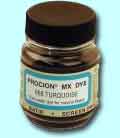advertisements
Procion MX Fiber Reactive Dye

Click Here to Buy
Crayola Fabric Crayons box of 8 from Mister Art
advertisements

Click Here to Buy
Crayola Fabric Crayons box of 8 from Mister Art
If you dye clothing, often the thread used to construct the garment stays white. Why?
Clothing is normally sewn with polyester thread, because it is strong and does not shrink. However, polyester cannot be dyed with any dye that works on cotton or other natural fibers. To dye polyester, you must use a special dye called Disperse Dye, which is sold at PROchem and is also available in the form of Crayola fabric crayons (which are used by drawing on paper and then ironing onto the fabric) and other iron-ons.
Garment dyeing with disperse dyes is not a fun project, being more difficult and dangerous than dyeing with the fiber reactive dyes we use on cotton or the acid dyes we use on wool. You don't want to try it just to color in the threads on a pre-sewn garment.
I've tried using fabric markers to darken thread in a garment, when the light color of the thread showed up badly after the fabric was dyed, but the results were not worth the trouble. The fabric markers that are very bright on cotton are much less bright on polyester, so they were not very effective. It would be better, probably, to try crayons made of disperse dye, such as Crayola Fabric Crayons (NOT the same product as their standard wax crayons!), but the dye in the crayons requires heat to transfer, with a dry home iron or with a heat transfer press. My personal conclusion is that it is not worth the trouble, though you may disagree. You could also use fabric paint to cover up the glaring white thread, though this would take several days as you must wait until the paint on one part of the garment is dry before turning it over to paint another section. When using fabric paint, be sure to exactly follow the manufacturer's instructions on drying, heat-setting, and washing.
A favorite solution to the problem of undyed thread is to buy clothing that has been sewn with cotton or silk thread. While cotton thread gives excellent results, silk thread would seem to be better because silk can be dyed with both cotton dyes and with acid dyes, unlike any other fiber. Sometimes, however, people find the same problem as with polyester thread - the silk thread simply does not take the dye. This is because it is common to wax silk thread before sewing with it; the wax blocks the dye from getting to the silk fiber. Scouring the silk, which means pre-washing with soda ash and a laundry detergent such as Synthrapol, may help, but, on silk, you may wish to avoid using the hot water that would make the scouring process most effective.
If you do not wish to have white thread, either you must find a source of clothing with dyeable thread, or you may prefer to dye fabric yardage and then hire a seamstress to sew yout fabric, using thread in colors that match the dyed fabric. It is sometimes possible to find quite good home sewers who charge reasonable sums of money to sew simple garments; see if your local fabric store has a bulletin board for this purpose.
Some garments actually look quite good with the white thread, which appears to most people as though it must have been added, as decorative stitching, after the fabric was dyed. People assume that the thread would have been dyed by the same process that dyed the fabric. You cannot simply buy every sort of white garments from just any store and expect good results, however, as dressier clothing calls out for matching thread.
Advertisements
 see answers to other FAQs about dyes and dyeing
see answers to other FAQs about dyes and dyeing
Page created: April, 2003
Last updated: July 25, 2006
Downloaded: Sunday, February 22, 2026
All of the pages on this site are copyright ©1998‑2026 Paula E. Burch, Ph.D.